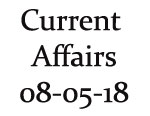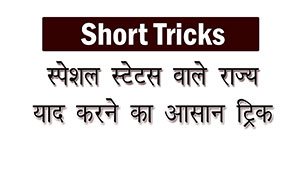-
Current Affairs 8th May 2018
Updated : 08-May-2018
Current Affairs 8th May 2018 - Important Points
- Hidden reserves of water ice discovered under surface of moon by - Tohoku University
- Key peptide to develop a vaccine for leptospirosis identified by - Gujarat Biotechnology Research Centre
- Vladimir Putin sworn in as Russian President for fourth time on - 7th May 2018
- Android Things for IoT platform launched by - Google
- 3rd edition of UNPCAP held in New Delhi from - 7th May - 25th May 2018
- Atomic clock for indigenous navigation satellites developed by - ISRO
Current Affairs 8th May 2018 - Details
Hidden reserves of water ice discovered under surface of moon by - Tohoku University
Researchers from Tohoku University, Japan have discovered mineral known as moganite in lunar meteorite that indicates to occurrence of plentiful hidden reserves of water-ice beneath the surface of the moon. The mineral found in a desert in north-west Africa could be potentially beneficial for future human exploration of moon.
Key Points- Moganite is a crystal of silicon dioxide. It is recognized to form on earth in specific situations in
sedimentary settings from alkaline fluids. It was, till date, never spotted in samples of lunar rock. - Scientists trust that mineral designed on surface of moon in area called Procellarum Terrane due to the originally present water in lunar dirt that had evaporated due to acquaintance to strong sunlight.
- But in the subsurface, plenty of water remains in the form of ice.
Key peptide to develop a vaccine for leptospirosis identified by - Gujarat Biotechnology Research Centre
Scientists from Gujarat Biotechnology Research Centre, Gandhinagar have effectively identified key peptide that can be utilised to produce a new preventive vaccine against leptospirosis. In their observation, scientists had recognized peptide sequences that could stick to vaccine for long-lasting immune response.
Key Points
- The scientists had utilised bioinformatics approach to study complete protein pattern of bacteria
Leptospira inter organs important peptide and tapering search to single effective immunogenic protein. - This protein was located to be present in almost all serovars of bacteria and can be effective vaccine
candidate in contradiction to most other serovars. - They had forecasted the ability to sticking to antibody present on T cells and B cells for inducing immune response.
- Among these proteins, they had further found to identify outer membrane proteins which play crucial roles in interaction between bacteria and their host. Then they searched for sites on human T-cells and B-cells where antigen could bind. The proof of identity of target sites is important step in vaccine design.
Leptospirosis - Leptospirosis is an emerging tropical infectious bacterial illness that affects humans and animals.
- It caused by bacteria known as Leptospira. It results into almost 60,000 deaths yearly, globally.
- The bacteria can be communicated via exposure to contaminated water, soil, direct contact with reservoirs hosts like wild or domestic animals.
- In humans, it can result into a wide range of symptoms including simple headaches, muscle pains, and fevers to severe with bleeding from the lungs or meningitis.
- Presently there is no preventive vaccination for humans that are available in market.
Vladimir Putin sworn in as Russian President for fourth time on - 7th May 2018
Vladimir Putin took oath as the President of Russia for 4th time in the Grand Kremlin Palace, Moscow on May 7th, 2018. With this, Putin will now be working in the office of President for another 6 years. However, the Russian constitution bars him from running once again for the elections after the conclusion of his new term in 2024.
Now, Putin has the right to nominate his preferred candidate for the position of Prime Minister.
Russian Presidential Elections 2018Important Highlights
- Putin's 4th term comes after he earnt the presidential elections in March 2018 with 76% of the votes to his name.
- He defeated Communist Party candidate Pavel Grudinin, who got 11.8% votes.
- Other names in the presidential race were Vladimir Zhirinovsky of the LDPR who got 5.66% votes,
- TV presenter Ksenia Sobchak who reveived 1.67% votes and Grigory Yavlinsky who got just over one% votes.
- Vladimir Putin’s political career Putin was a previous agent for the Russian spy agency KGB, who came out as Russia's PM in 1999 and he became temporary President of Russia in December 1999.
- He took over the presidency at the age of 47 in March 2000 and continue to secure his second term victory in 2004.
- After working the 2nd term, Putin was banded from running for a 3rd successive term by the Russian constitution, but as an alternative he became the PM and he assisted from 2008-2012.
- If his stint as PM during 2008 to 2012 is counted, he is Russia’s longest ever ruling leader since Soviet dictator Josef Stalin, who was in ruling for 31 years.
- He completed his graduate from the International Law branch of the Law Department of the Leningrad State University.
Android Things for IoT platform launched by - Google
Alphabet Inc’s giant Google released Android Things, which is a variant of Android operating system for
Internet of Things gadgets including smart home appliances and other smart machines. Its objective is to enable Internet of Things machines designers to be made faster, inexpensive and more secure.
More about Android Things- It is Android-based embedded operating system platform established by Google.
- It is intended to be used with less-power and memory constrained Internet of Things gadgets, which are usually built from different microcontroller unit platforms.
- Android Things as an Internet of Things Operating System it is intended to work as low as 32–64
megabytes of RAM. - It will support Bluetooth Low Energy and WiFi. Google also presented Weave protocol along with Android Things, which will be utilised by these gadgets, will utilise to communicate with others.
- Every Android gadget can robotically recognize any Weave API grounded device.
- Subscribers can select a device, form it and utilise it immediately.
3rd edition of UNPCAP held in New Delhi from - 7th May - 25th May 2018
The 3rd edition of UN Peacekeeping Course for African Partners was organised in New Delhi from May
7 th -25th, 2018. The course was directed by Centre for United Nations Peacekeeping in India in
corporation with USA.
Key Points- UN Peacekeeping Course for African Partners-03 was focused at building and enhancing capacity of the African Troop Contributing Countries to United Nations and to further train instructors from these nations.
- The students who took part in this 2-week course included officers who are currently employed
in their individual peacekeeping training centres. - These African military majors will in turn train troops in their individual nations. The 1st and 2nd editions of the course were organised in New Delhi in 2016 and 2017.
- These courses are being seen as milestone in many ways at international forum, which also reflect
India.
India and UN Peacekeeping - India is the biggest troop contributor to United Nations Peacekeeping Missions that are authorized to preserve stability and exchange peace settlement in turbulent areas worldwide.
- So far India has delivered almost 200,000 troops in nearly 50 of 71 United Nations peacekeeping missions over last 6 decades, including 13 of present 16 missions.
Atomic clock for indigenous navigation satellites developed by - ISRO
The ISRO has advanced an atomic clock that will be utilised in navigation satellites to measure precise location information. Till date, the space agency has been importing the atomic clocks for its navigation satellites from the European aerospace producer Astrium.
All 7 navigation satellites, which have been released earlier as part of the Indian Regional Navigation Satellite System, have 3 imported Rubdium atomic clocks each.Highlights of ISRO’s atomic clock
- The atomic clock has been advanced by Ahmedabad-based Space Applications Centre and is presently undergoing a series of qualification tests.
- Once tested effectively, the atomic clock will be utilised in an experimental navigation satellite to check its accuracy and durability in space.
- With the progress of the atomic clock, Indian Space Research Organisation has become one of the few space organisations in the world that are capable to develop this highly cultured technology.
Key Objective - Navigation satellite is secure with 3 atomic clocks. Besides atomic clocks, a navigation satellite also contains crystal clocks but they are not as much as accurate as atomic clocks.
- The time difference among the atomic clocks of various satellites located at various orbits is utilised to calculate the exact positioning of a navigation receiver on the Earth.
- As nine of the 21 atomic clocks utilised in already released 7 navigation satellites are reflecting error, therefore, Indian Space Research Organisation deliberated to release 4 backup navigation satellites to retain the NaVIC effective.
- These backup satellites, will enhance buffer to the nation’s GPS system.














